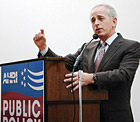
During the 2008 AHRI’s Public Policy Symposium, Sen. Bob Corker, R-Tenn., warned attendees about the implications of the Lieberman-Warner bill.
Sen. Johnny Isakson, R-Ga., told the group to “expect the second and third quarter to be really rough for the U.S. economy.” He didn’t hold much hope that the individual tax rebate checks would do much to spur the economy. In an effort to directly address the mortgage crisis and the housing downturn, the senator has introduced his own legislation to provide a $15,000 tax credit on the purchase of a new home.
He was also critical of the Lieberman-Warner Climate Change Bill that is currently before Congress because it severely punishes companies and industries for decisions made in the past rather than rewarding them for decisions made in the future.
Sen. Bob Corker, R-Tenn., who serves on the energy committee, was also critical of the Lieberman-Warner bill. “We need something that makes us more energy secure in the future, not the opposite,” he said. He was critical of the cost of the legislation as well, which he claimed would add up to $2 trillion by 2030.
Sen. Blanche Lincoln, D-Ark., admitted to the group that Congress has been moving at a snail’s pace this year and positioned herself as an independent looking for solutions that “get results for the American people.” She expressed support for tax incentives for consumers that buy and use energy-efficient products and research and development tax credits for companies that develop energy-efficient and energy-saving products.
Over 50 executives from AHRI member companies spent the remainder of the day meeting with representatives and senators from their districts and states in an effort to make Congress aware of the positive role the industry has played in energy efficiency and the elimination of CFCs and HCFCs in refrigerants used in industry products. Steve Yurek, AHRI president, reminded the group that the association’s influence on Capitol Hill comes from 350 companies employing over 200,000 potential voters.
Publication date:03/24/2008

Report Abusive Comment